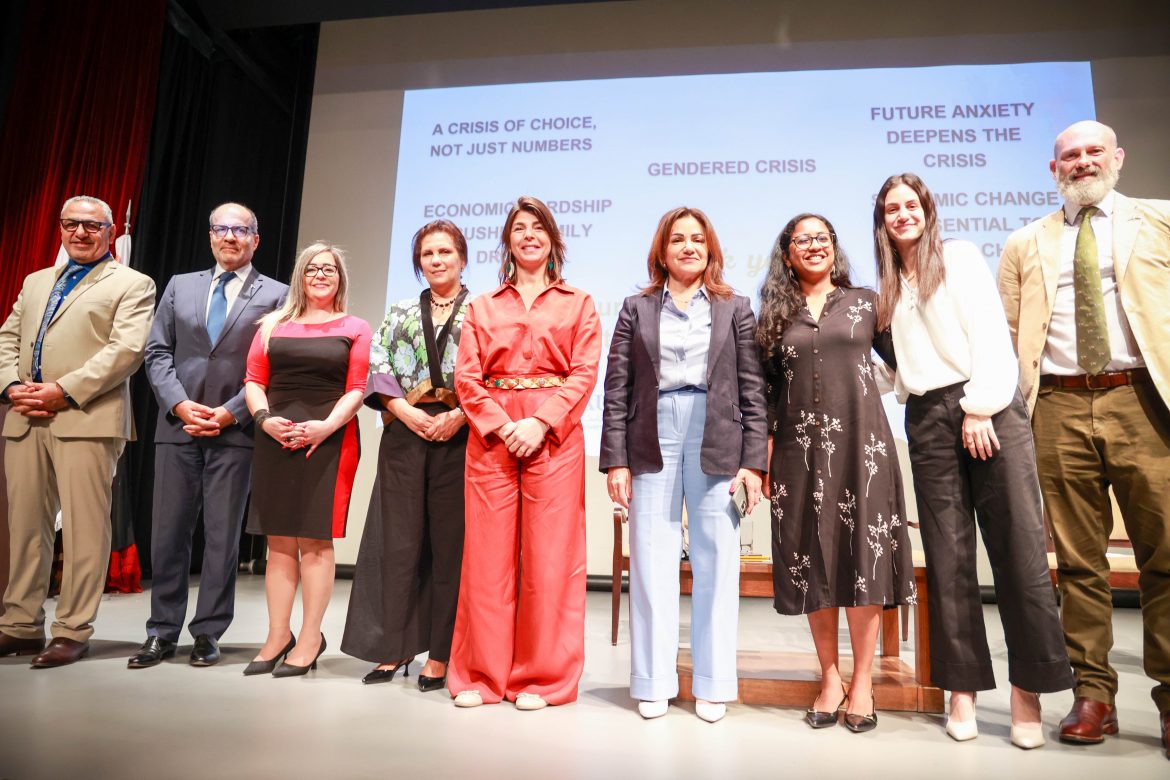Beirut, Lebanon – July 11, 2025 – The United Nations Population Fund (UNFPA) marked World Population Day with the regional launch of its flagship State of World Population report (SWOP) 2025 “The real fertility crisis” at the Lebanese American University (LAU) in Beirut.
The event was held in the presence of H.E. Minister of Social Affairs of Lebanon, Ms. Haneen Sayed, UNFPA Regional Director for Arab States, Laila Baker; Resident Coordinator / Humanitarian Coordinator a.i. for Lebanon, World Food Programme Representative, Matthew Hollingworth; and UNFPA Representative in Lebanon, Anandita Philippose.
Under the theme “Choice, Not Chance,” the event brought together policymakers, youth advocates, and experts to address the pressing challenges that shape fertility decisions in Lebanon and the Arab region.
The launch began with an opening statement by the UNFPA Representative in Lebanon. This was followed by a speech from the UNFPA Regional Director for Arab States, who framed the region’s fertility decline as a crisis of constrained dreams and options rather than mere demographics.
She added, “Across generations, family has been our anchor—but today, young people face barriers our grandparents never imagined.”
The report reveals that globally, 1 in 5 people are having fewer children than they desire due to economic instability, gender inequality, and climate anxiety. In the Arab world, these pressures are amplified:
- Youth unemployment stands at 25.2% (37.7% for young women—triple the global average).
- 1 in 10 women lack access to family planning, rising to 1 in 5 in some countries.
- Housing unaffordability and absent childcare policies force delays in marriage and parenthood.
The Regional Director shared testimonies from young Arabs, like Amal from Cairo, who postponed children due to financial insecurity, and Yousef from Jordan, who struggles under societal expectations to be the sole provider. “This is not a youth problem—it’s an intergenerational crisis,” she stressedز
From Alarm to Action: A Blueprint for Choice
H.E. Minister of Social Affairs of Lebanon, Ms. Haneen Sayed, shared that “in response to these challenges, we have taken concrete steps to redefine our approach to social policy. And we developed a renewed vision. A society in which all individuals enjoy dignity, justice, and social rights, within a comprehensive social protection framework that reduces poverty, improves quality of life, and achieves sustainable development.”
The report outlines four pillars for change: Economic security (jobs, affordable housing), gender equality (parental leave, shared caregiving), universal reproductive healthcare (contraception, fertility treatments) and dismantling harmful norms (rigid gender roles, workplace stigma).
A high-level intergenerational dialogue followed, featuring youth, policymakers, and ageing people. Participants echoed the report’s core message: “The crisis isn’t low fertility—it’s the lack of real choice.”
About UNFPA and the State of World Population Report:
As the United Nations sexual and reproductive health agency, UNFPA helps people obtain contraception and life-saving reproductive health services and information and empowers women and girls to make informed decisions about their bodies and lives. It also helps countries use population data to better understand and harness the opportunities that can come with demographic change.
The State of World Population report is UNFPA’s annual flagship publication. Published yearly
since 1978, it shines a light on emerging issues in the field of sexual and reproductive health
and rights, bringing them into the mainstream and exploring the challenges and opportunities
they present for international development.

